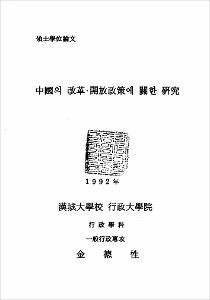中國의 改革.開放政策에 關한 硏究
- Files in This Item:
-
-
Download
 000000066359.pdf
기타 데이터 / 4.81 MB / Adobe PDF
000000066359.pdf
기타 데이터 / 4.81 MB / Adobe PDF
-
Items in Repository are protected by copyright, with all rights reserved, unless otherwise indicated.
 000000066359.pdf
기타 데이터 / 4.81 MB / Adobe PDF
000000066359.pdf
기타 데이터 / 4.81 MB / Adobe PDFItems in Repository are protected by copyright, with all rights reserved, unless otherwise indicated.